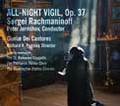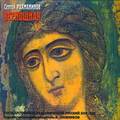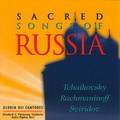Sergei Rachmaninoff (1873-1943)

 Sergei Rachmaninoff
All-Night Vigil, Op.37
Sergei Rachmaninoff
All-Night Vigil, Op.37
Gloriae Dei Cantores, St. Romanos Cappella, the Patriarch Tikhon Choir, and the Washington Master Chorale
Peter Jermihov
Paraclete Press
A140
 Sergei Rachmaninoff
Rachmaninoff: All Night Vigil (Vespers)
Sergei Rachmaninoff
Rachmaninoff: All Night Vigil (Vespers)
USSR Academic Russian Choir
A. Sveshnikov
Melodia/Holy Trinity-St. Sergius Monastery
A128

Bless The Lord, O My Soul...
Russian Religious Hymns; Recordings from the 1940s-1950s
Ivan Semyenovich Kozlovsky, Tenor
| Get the Sheet Music for this track: Ra024 |  |

Come Let us worship
Rachmaninoff: All Night Vigil (Vespers)
USSR Academic Russian Choir
| Get the Sheet Music for this track: Ra023 |  |

Come, Let Us Worship
Gloriae Dei Cantores, St. Romanos Cappella, the Patriarch Tikhon Choir, and the Washington Master Chorale
| Get the Sheet Music for this track: Ra023 |  |

Blessed Is The Man...
Russian Religious Hymns; Recordings from the 1940s-1950s
Ivan Semyenovich Kozlovsky, Tenor
| Get the Sheet Music for this track: Ra025 |  |

Bless the Lord, My Soul
Gloriae Dei Cantores, St. Romanos Cappella, the Patriarch Tikhon Choir, and the Washington Master Chorale
| Get the Sheet Music for this track: Ra024 |  |

Bless the Lord, O My Soul
Rachmaninoff: All Night Vigil (Vespers)
USSR Academic Russian Choir
| Get the Sheet Music for this track: Ra024 |  |

Blessed is the man
Rachmaninoff: All Night Vigil (Vespers)
USSR Academic Russian Choir
| Get the Sheet Music for this track: Ra025 |  |

Blessed Is the Man
Gloriae Dei Cantores, St. Romanos Cappella, the Patriarch Tikhon Choir, and the Washington Master Chorale
| Get the Sheet Music for this track: Ra025 |  |

O Gladsome Light...
Russian Religious Hymns; Recordings from the 1940s-1950s
Ivan Semyenovich Kozlovsky, Tenor
| Get the Sheet Music for this track: Ra026 |  |

Rejoice, O Virgin (from All-Night Vigil, op. 37)
Gloriae Dei Cantores
| Get the Sheet Music for this track: Ra028 |  |







